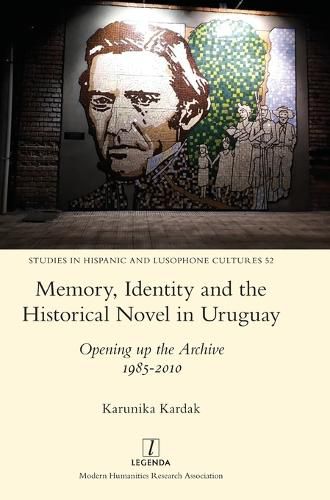Readings Newsletter
Become a Readings Member to make your shopping experience even easier.
Sign in or sign up for free!
You’re not far away from qualifying for FREE standard shipping within Australia
You’ve qualified for FREE standard shipping within Australia
The cart is loading…






This title is printed to order. This book may have been self-published. If so, we cannot guarantee the quality of the content. In the main most books will have gone through the editing process however some may not. We therefore suggest that you be aware of this before ordering this book. If in doubt check either the author or publisher’s details as we are unable to accept any returns unless they are faulty. Please contact us if you have any questions.
In the quarter-century following Uruguay's transition to democracy in 1985, there was a surge in the writing and popularity of historical novels. Authors such as Tomas de Mattos, Amir Hamed, Susana Cabrera, Mario Delgado Aparain and Marcia Collazo Ibanez engaged with archival sources, historical works, school textbooks, monuments and other forms of material culture in their bid to re-engage with the past.
In her new study, Kardak follows the trajectory of recent Uruguayan historical fiction. Though these post-transition authors do not directly represent the 1973-85 dictatorship, instead depicting events of the nineteenth century, they nevertheless use history to address very present concerns of cultural identity. Heroes of independence such as Jose Gervasio Artigas (1764-1850) are reassessed, and historically marginalised groups like the Indigenous Charruas and Afro-Uruguayans are brought into the forefront of the national story.
$9.00 standard shipping within Australia
FREE standard shipping within Australia for orders over $100.00
Express & International shipping calculated at checkout
This title is printed to order. This book may have been self-published. If so, we cannot guarantee the quality of the content. In the main most books will have gone through the editing process however some may not. We therefore suggest that you be aware of this before ordering this book. If in doubt check either the author or publisher’s details as we are unable to accept any returns unless they are faulty. Please contact us if you have any questions.
In the quarter-century following Uruguay's transition to democracy in 1985, there was a surge in the writing and popularity of historical novels. Authors such as Tomas de Mattos, Amir Hamed, Susana Cabrera, Mario Delgado Aparain and Marcia Collazo Ibanez engaged with archival sources, historical works, school textbooks, monuments and other forms of material culture in their bid to re-engage with the past.
In her new study, Kardak follows the trajectory of recent Uruguayan historical fiction. Though these post-transition authors do not directly represent the 1973-85 dictatorship, instead depicting events of the nineteenth century, they nevertheless use history to address very present concerns of cultural identity. Heroes of independence such as Jose Gervasio Artigas (1764-1850) are reassessed, and historically marginalised groups like the Indigenous Charruas and Afro-Uruguayans are brought into the forefront of the national story.